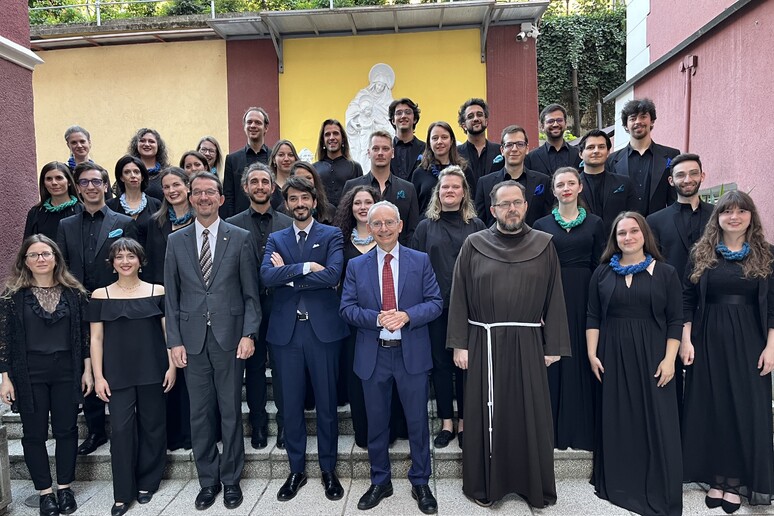Over the weekend, Sarajevo played host to the youth vocal group Vikra - Chamber Choir of Glasbena Matica ('musical homeland' in Slovenian) from Trieste, which performed on Saturday, 15 June in the Franciscan Church of St. Anthony, staging the concert 'Encounters. Flashes of Light and Shadows', and on Sunday 16, at St Joseph's Church, during the Holy Mass.
Founded in 2014 around the figure of the award-winning conductor Petra Grassi, the group is made up of around thirty Italian and Slovenian choristers, including members of the Slovenian minority in Italy, mainly from Trieste, Gorizia, Udine, Koper/Capodistria and Ljubljana. A composition in the sign of inter-ethnic reconciliation, which led the Italian Embassy in Bosnia Herzegovina to share the event with the Embassy of Slovenia and the United Nations Population Fund (UNFPA), which has long been a partner of the Italian Embassy in numerous initiatives aimed at young people and promoting inter-ethnic cohesion in the Balkan country (in particular the 'Moving us closer' project, financed by the Ministry of Foreign Affairs and International Cooperation).
This was undoubtedly a choice not only of great cultural depth but also of high symbolic value in a country like Bosnia and Herzegovina, still fragmented following the conflict of the 1990s. Vikra's interpretations elicited enthusiastic reactions from the audience, who were offered a dense and complex repertoire, ranging from the Renaissance to the contemporary age, alternating between Italian, Slovenian, English, Latin and Old Church Slavonic.
In his opening remarks, Ambassador Marco Di Ruzza did not fail to emphasise the meaning behind the choice of such a choir. Quoting the words pronounced in 2021 by President Sergio Mattarella during the joint visit made with the then President of Slovenia Borut Pahor to Gorizia and Nova Gorica (European Capitals of Culture in 2025), the Ambassador recalled how Italy and Slovenia have been able to build a shared memory, trying to respectfully and with a rigorous and scientific approach to the painful events suffered in the 'Short Century', with the aim of looking together at a shared horizon in the common membership of the European family. "Our hope," Di Ruzza concluded, "is that these words, spoken with reference to Italy and Slovenia, can soon be referred to Bosnia and Herzegovina as well. Making this possible is not only our hope, but our priority commitment as an international community'.
"Vikra's interpretative excellence," said Director Petra Grassi, "and the power of meaning inherent in the musical choices receive meaning from a place like Sarajevo and return it amplified to the listening audience. It is a secular spirituality, because it becomes an instrument to be welcomed by anyone in respect of everyone's faith, overcoming any barriers that nationalism or fundamentalism may erect".
Numerous compatriots were present in the audience, joining several representatives of the international community - including the High Representative for Bosnia Herzegovina, Christian Schmidt - and exponents of the cultural world and local civil society.
ALL RIGHTS RESERVED © Copyright ANSA











